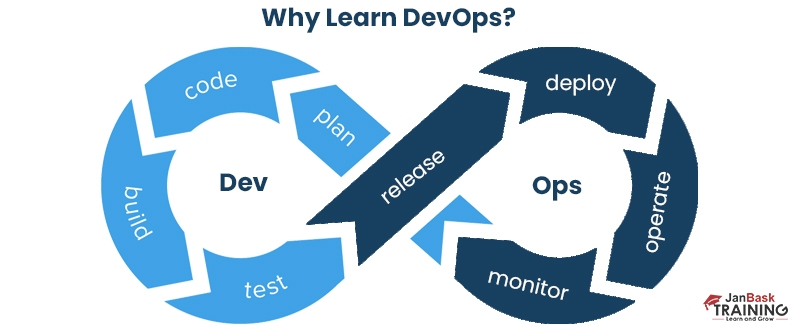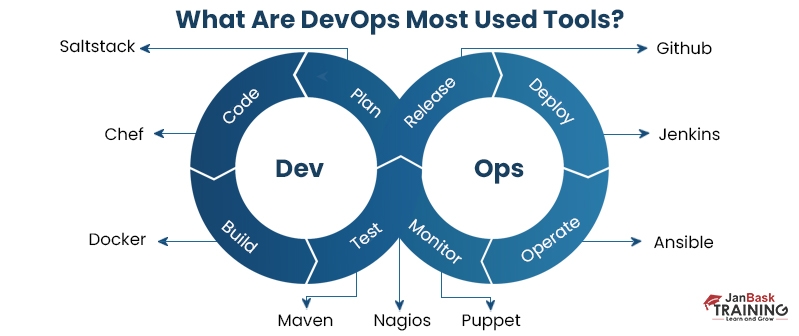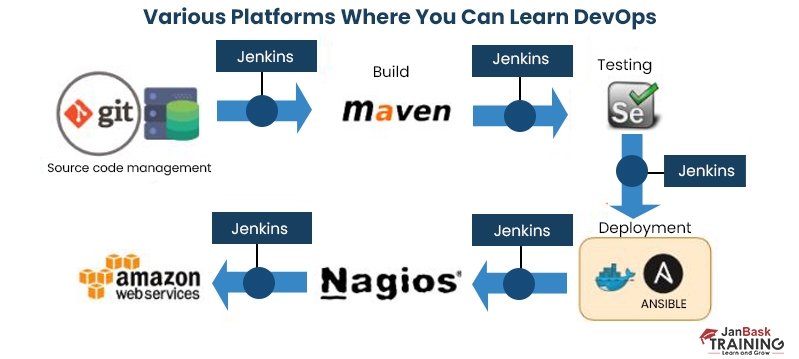25
SepGrab Deal : Upto 30% off on live classes + 2 free self-paced courses - SCHEDULE CALL
A vast number of organizations are using DevOps to smoothen their organizational operations so that they can manage their production and operation in a productive manner. Therefore, DevOps engineers are much more in-demand. Moreover, it is among the highest paid jobs in the modern technical marketplace.
A DevOps engineer basically merges all of these departments in an integrated manner so that they can deliver the software quickly. Moreover, the security is updated in a quick manner both internally and to the customers. The main concern of a DevOps engineer is to launch software safely and to provide updates quickly. Here in this way, the complete process becomes reliable.
Therefore, today we have brought this article for those who want to be a successful DevOps engineers. This is a complete guide that can help them to find all the necessary information about this profession. Firstly, we will introduce DevOps and then provide all the information related to this profession.

DevOps is a software development technique that integrates the development and operations teams to provide a more streamlined and efficient software development process. DevOps attempts to increase the pace and quality of software development by breaking down conventional divisions between Development and operations and encouraging cooperation and communication between the two teams.
DevOps offers a range of benefits for organizations that adopt it, including faster time to market, improved quality, better collaboration, increased efficiency, and greater agility. By embracing DevOps, organizations can create a more effective and efficient software development process that delivers higher quality software faster.
DevOps has grown in popularity in recent years because of its numerous advantages to businesses that employ it. Here are some of the critical reasons DevOps has become such a fundamental methodology in software development:
In the next section, we will provide you with all the information you need to know about becoming a DevOps engineer and the career benefits that come with it.

DevOps Tools Many DevOps tools are available on the market, and choosing the right ones for your organization can be challenging. Here are some of the most well-liked DevOps tools and some examples of their applications:
These are only a handful of the numerous DevOps tools readily available. It's crucial to consider your organization's unique requirements when selecting DevOps solutions, as well as aspects like usability, scalability, integrations with other products, and simplicity of use.
Read on to our next section to learn through the DevOps learning path.

DevOps is a popular field in IT that requires a combination of skills, knowledge, and experience in software development, operations, and automation. If you are interested in pursuing a career as a DevOps engineer, there are several ways to learn the necessary skills and gain the required experience.
Courses and Certifications: Several online and offline courses and certifications cover the basics of DevOps and advanced topics. Some of the popular courses include:
These courses and certifications offer hands-on experience and knowledge of various DevOps tools, technologies, and methodologies.
Short-term Courses: If you are looking for a quick way to learn DevOps, consider short-term courses. These courses typically last for a few weeks or months and cover the basics of DevOps. Some popular short-term courses include:
These courses are ideal for individuals who want to gain a basic understanding of DevOps and its principles.
Long-term Courses: Long-term courses are ideal for individuals who want to understand DevOps and pursue a career in this field. These courses can last several months or years and cover advanced topics such as cloud computing, containerization, and automation. Some popular long-term courses include:
These courses offer in-depth knowledge and hands-on experience of DevOps tools, technologies, and methodologies.
On-the-job Training: If you already work in the IT field, you can gain DevOps skills and experience through on-the-job training. Many organizations offer on-the-job training programs for their employees that cover various DevOps tools, technologies, and methodologies. You can also work on side or open-source projects to gain practical experience in DevOps.
There are several ways to learn DevOps skills and gain experience, including courses and certifications, short-term courses, long-term courses, and on-the-job training. Choose the option that best fits your learning style, schedule, and career goals. Becoming a successful DevOps engineer requires continuous learning, upskilling, and staying up-to-date with the latest trends and technologies.
The complexity of software development and IT operations increases as technology does. This is where the role of a DevOps engineer Course comes in. A DevOps Engineer bridges the development and operations teams, creating and implementing software systems to ensure smooth and efficient operations.
Working collaboratively with software developers, quality assurance professionals, and other IT staff, a DevOps Engineer develops, installs, tests, configures, and maintains IT solutions. They also play a crucial role in communicating operational requirements and development forecasts to ensure seamless collaboration among team members.
In addition to these responsibilities, a DevOps Engineer is also responsible for developing plans and processes for improving and expanding the current technologies being used. They deploy updates automatically into the production environment using configuration management software and perform routine application maintenance and troubleshooting measures to ensure that the production environment runs smoothly.

If you want to become a DevOps engineer, there are some steps you can take to achieve this goal. Here are some general guidelines:
Becoming a DevOps engineer requires education, experience, and practical skills. By following these steps, you can gain the knowledge and experience necessary to succeed in this field.

Here are some tips that can help you become a successful DevOps professional. These are listed below:
Whether you are an operation vendor or a developer, now is the time to acquire extra skills other than your present skills, especially if you are trying to become a DevOps professional. It would have also been great if DevOps professionals knew every department, like developers and operations, as a developer will surely have a better understanding and knowledge of IT tools than someone not from an IT background.
You must learn all new technologies and concepts to become a successful DevOps engineer. By learning new technologies, you can even become an expert developer of Chef and Puppet scripts and Linux administrator. Languages like Perl, Python, and Ruby must also be known to you.
Many organizations like to hire professionals with the same and relevant experience or who have lived the life of DevOps professionals. Even if they have the skills and that type of background, they can easily grasp their job role and make their life easier. Usually, system administrators become successful DevOps engineers most of the time.
People who know automation can do a lot, even in minimum time. They use the tools for automation and deployment of the server and can accomplish even longer tasks in minimum time. DevOps engineers can also improve their earnings and marketability if they know the tools that make the task easier. This may also require knowledge of the tools and tasks.
After grasping and collecting all required skills, now is the time to put them or show them to the clients in a way that can benefit you. For this, you must keep involved in the DevOps community. You can also remain highly active in DevOps forums and remain involved in the new activities and events that happen online or in your nearby location. Through such forums, you can get the answers to your questions and even the answers to all your doubts.
To become an active member, you must also have curiosity and empathy, two of the profession's most valuable and potential skills. If you have these skills, your employer will remain happy and believe you have all the necessary skills to be a successful professional. Curiosity can help you get all the latest information about the field, so empathy means having all the necessary skills to develop the right skill.
A DevOps engineer is a technical professional who knows the basics of software development like SDLC or software development lifecycle; he must be able to use engineering tools and processes so that all operational challenges can be resolved easily and quickly. DevOps engineers must be able to handle all challenges of SDLC, including coding, testing, and integration the goal of these professionals is to improve the speed and collaboration of all departments of the organization.
Senior software developers and system administrators typically become DevOps engineers with the basic business process, organizational operations, configuration, leadership operations, and automation skills. With these skills, they can manage the overall operations and performance of the organization.
Engineers basically perform code changes and release new code versions to manage frequent and incremental changes. In this way, testing and deployment can become possible in a frequent manner. Different coding elements, libraries, and SDKs can be connected, and various components can be integrated into SQL data management and messaging tools to manage software releases for every OS and production environment.
Though DevOps can make the complete development and deployment process easier and quicker, there are still some myths associated with this profession. Some organizations suppose that DevOps does all of this in an unethical way, so such companies even hire DevOps but do not give the exact title.
The median salary of DevOps engineers in the USA market is around $105,000 per job listing site. However, the salary may vary depending on the company's geographic location in Silicon Valley, and as per Indeed, DevOps professionals earned $166,448 in 2018.
According to recent job market trends, the average salary for a DevOps Engineer in the United States is around $115,000 annually. However, this figure can range from $90,000 to $150,000 annually, depending on the job role and location. The average salary for a DevOps Engineer is also relatively high in other countries, such as the UK, Canada, and Australia. Overall, the salary of a DevOps Engineer is quite competitive, and this is expected to continue as more and more companies adopt DevOps practices.
DevOps is a software development approach that combines the practices of development and operations teams to create a culture of collaboration, communication, and continuous improvement. DevOps has many practical applications in modern software development, including:
In conclusion, DevOps is a valuable approach for modern software development, enabling faster time to market, improved quality, increased efficiency, better collaboration, enhanced security, and continuous improvement. By adopting DevOps practices, organizations can stay competitive and deliver high-quality software that meets the needs of their customers.
As technology advances, software development has become essential for organizations to build an online presence, create tools for internal teams, optimize purchased software, and develop software for external clients. However, the lack of DevOps skills has made it challenging for many organizations to manage software development effectively. But fear not! By mastering the following skills, you can help close the DevOps skills gap and position yourself for a role on a DevOps team.
The Skills required are:
To become a DevOps engineer, you can enroll in DevOps corporate training & certification and take short-term courses, long-term courses, or certifications. Learning the DevOps learning path is essential to become a DevOps engineer. Once you have mastered DevOps skills, you can enjoy a successful career with job opportunities, salary, and career growth.
The reason behind this increased demand is an increase of enterprise digitization to automate their business process and the rising of cloud technology adoption along with agile frameworks even today, IT organizations are trying to improve their operational efficiency and reports; as per this, the American, market will lead in the near future, and there will be many opportunities for DevOps engineers in that market.
Hence if you want to become a successful DevOps engineer, all the required skills can help you easily grasp the technical and operational skills. The DevOps learning path encompasses many skills, including automation, continuous integration and delivery, cloud computing, containerization, configuration management, and more. Several tools are available to assist you in understanding DevOps, including online courses, certifications, and community forums.
As far as job interview professionals are concerned, there may be some of the below-listed questions that employers frequently ask:
You can find a number of online courses for DevOps engineering courses like Puppet and others. Usually, these professionals are interested in deployment, network operations, and system administration work. They must learn scripting and coding to improve test and deployment.
Those interested in the DevOps role should enhance their skills, expand their experience, and learn all new automation tools and coding. You can search for a mentor or required tools that can help you in learning DevOps requirements and tools simultaneously.
In conclusion, the DevOps learning path may help you progress in your career and contribute to your company's success. So if you're interested in learning DevOps, now is a great time to start! It is an exciting and fulfilling journey.
 Pinterest
Pinterest
 Email
Email
The JanBask Training Team includes certified professionals and expert writers dedicated to helping learners navigate their career journeys in QA, Cybersecurity, Salesforce, and more. Each article is carefully researched and reviewed to ensure quality and relevance.

Cyber Security

QA

Salesforce

Business Analyst

MS SQL Server

Data Science

DevOps

Hadoop

Python

Artificial Intelligence

Machine Learning

Tableau
Search Posts
Related Posts
Receive Latest Materials and Offers on DevOps Course
Interviews